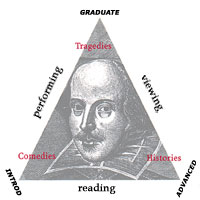reading
A Basic Paradigm for Literary Analysis
This commonsense, universally applicable outline
of topics derives largely from The Poetics by Aristotle,
written in the fourth century B.C.E.

A. plot/narrative/story/action
1. beginning, middle, end [applies to the whole work and to parts like chapter, scene or stanza]
2. climax/ turning point
B. character
1. name
2. type: gender/age/class/profession/family ties/community and cultural ties
3. physical appearance: body and clothing
4. interior qualities: personality, emotions, ethical standards
5. change [through the action]
6. relationships
C. setting
1. time: historical period; movement through time
2. space: geography, places; travel
D. theme
1. abstract idea, polarity
2. didactic moral
E. language
1. sound effects
2. style: register, unit lengths, repetition and variation [parallel and balance]
3. symbol
4. figures of speech
5. irony
6. allusion
| TOP |